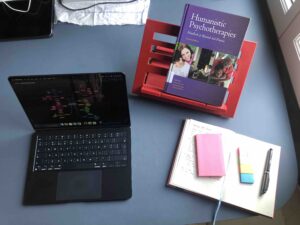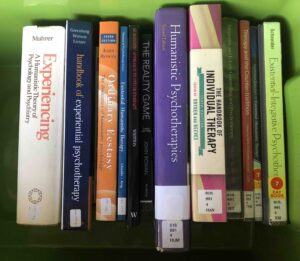Back from France, and more than content with the week: the creative and self-care intentions accomplished. When I arrived in Normandy, I pondered what a “good week” would look like for book number 2. I set the intention to
- know my rationale for this book, including who it was for and why it would be useful
- figure out how to include the research findings from the interviews I completed last autumn
- develop a list of themes in humanistic psychotherapy that I deem important in the way I practice, supervise, and teach
- draft a table of contents
Et voila! Je suis tres contente
And yet within that, it was far from being all ‘smiles and miles’. What I am coming to know as a fledging writer is to expect moments of wrestle, angst, doubt…and that these are part of what takes us to the “a-ha” and fulfilment. There were many days when I quit the desk late morning, saddled up for an hour in the Spring sunshine on my bike, and trusted that psyche would be working through the writing dilemma I was facing. Other days, I simply had to have faith in those moments of looking out of the window to the scenery and wildlife …that a blank screen and (seemingly) blank mind ARE part of the process – its so easy in those experiences to tighten and feel in a freeze.
 The week was also my chance to get to grips with two apps I was curious to adopt for idea generation and my writing practice. The way both Simple Mind and Scrivener* work allowed me to get ideas down through brain storming, and trust that the order of their arrival in psyche didn’t matter – Simple mind allowed me to capture all my ideas (as long as I remembered them as I pedalled up a steep Norman hill!) and play with how they clustered; and from there, I could sketch out an ordering in Scrivener, also knowing that I was still able to move content around as I compile the book. I love techie stuff like this…
The week was also my chance to get to grips with two apps I was curious to adopt for idea generation and my writing practice. The way both Simple Mind and Scrivener* work allowed me to get ideas down through brain storming, and trust that the order of their arrival in psyche didn’t matter – Simple mind allowed me to capture all my ideas (as long as I remembered them as I pedalled up a steep Norman hill!) and play with how they clustered; and from there, I could sketch out an ordering in Scrivener, also knowing that I was still able to move content around as I compile the book. I love techie stuff like this…
…and this added to my sense of what makes writing so enjoyable for me – I relish the taking of ideas and theories, pondering over them, wrestling with them: knowing that there IS a way that these ideas relate, dovetail…chewing my lip, pacing the room, making a third coffee** (in too short a time) and simply staring out into space. And this is what a block of writing time brings me – space to let the knots untangle, the nuggets to fall out of the workings. I think back to my MSc research dissertation (also written in Normandy by the way) and how I had to learn that lesson – just write, just suffer; go into the torment of not knowing the outcome and stay with the process that psyche needs me to visit.
 It somehow speaks to the content of the book I am developing here. There are many, many good books on what humanistic therapy is. When I looked through the books I have collected on the humanistic tradition, it was overwhelming to think “how can I contribute to this field?”. But in my moments-of-mulling, I came to find my offering – one that synthesises from a first person perspective: this book, like my first, will be a sharing of my experience of developing a humanistic psyche-therapy: one that celebrates our roots in both humanistic psychology and European existential-phenomenological philosophy…but also adopts a theoretical stance that ensures the philosophy is brought toward a clear methodology. I know the humanistic view of the human predicament is an accurate one; and my motivation is to help practitioners make it one that is effective.
It somehow speaks to the content of the book I am developing here. There are many, many good books on what humanistic therapy is. When I looked through the books I have collected on the humanistic tradition, it was overwhelming to think “how can I contribute to this field?”. But in my moments-of-mulling, I came to find my offering – one that synthesises from a first person perspective: this book, like my first, will be a sharing of my experience of developing a humanistic psyche-therapy: one that celebrates our roots in both humanistic psychology and European existential-phenomenological philosophy…but also adopts a theoretical stance that ensures the philosophy is brought toward a clear methodology. I know the humanistic view of the human predicament is an accurate one; and my motivation is to help practitioners make it one that is effective.
Another challenge for me will be how to make this all happen. I now sit with a well-developed plan: a book of three parts (history, research findings, themes in humanistic psychotherapy), and about 80,000 words to write. The book is going to be, on the whole, a series of short essays – and again, I relish that. But first, the task is to write to the tradition’s history and culture of counselling to set up my personal thesis and rationale.
Exciting to be truly starting; the challenge is making it happen.
- *mind mapping software, and a word processing and outliner package used by writers
- **my colleague and I now call this coffee, the third “the Ogden”

